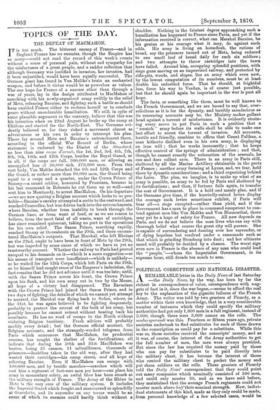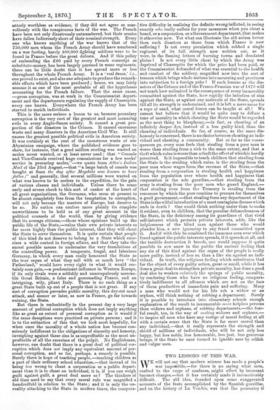POLITICAL CORRUPTION AND NATIONAL DISASTER'.
AREMARKABLE letter in the Daily News of last Saturday- -the Daily News, by the way, has been by far the richest in correspondence of value, correspondence with nug- gets of fact in it, since the war began,—seems to afford the real key to the explanation of the gigantic failures of the French Army. The writer was told by two graziers of Picardy, as a. matter within their own knowledge, that in a very considerable number of instances which they could specify the military authorities had got only 1,800 men in a full regiment, instead of 3,000, though there were 3,000 names on the rolls. The modus operandi was this. Fourteen or fifteen years ago, private societies undertook to find substitutes for such of those drawn in the conscription as could pay for a substitute. While this was so, those societies received the conscripts' money, and as it was, of course, the interest of the Army authorities to get the full number of men, the men were always provided. But since the law has required the money paid by those who can pay for substitutes to be paid directly into• the military chest, it has become the interest of those who control the military chest to pocket the money and put sham soldiers on the rolls. These graziers of Picardy told the Daily News' correspondent that they could point out many companies which nominally consisted of 100 men, and could only muster 30, and as we have said before, they maintained that the average French regiments could not muster much above half their nominal strength. Now, indivi- dual statements of this kind, made as they only could be made, from personal knowledge of a few selected cases, would bit
utterly worthless as evidence, if they did not agree so mar- vellously with the conspicuous facts of the war. The French have been not only disastrously outnumbered, but their armies have fallen ludicrously short of their nominal strength. Every one who knows anything of the war knows that of the 750,000 men whom the French Army should have numbered on a war footing, barely 400,000 fighting soldiers were to be found in France before the great defeats. And if this policy of embezzling the £80 paid by every French conscript as -substitute-money, has been largely pursued in some regiments, there can be little doubt that it has spread more or less throughout the whole French Army. It is a 'real clause,' i.e., one proved to exist, and also one adequate to produce the remark- able effects which have been produced ; hence, we may fairly assume it as one of the most probable of all the hypotheses accounting for the French failure. That the same cause, —gross corruption, was at work in the Commissariat depart- ment and the departments regulating the supply of Chassepols, every one knows. Everywhere the French Army has been starved to enrich individuals.
This is the more serious a lesson to us, because pecuniary -corruption is the very root of the greatest and most menacing evils in every Anglo-Saxon society. It caused a great pro- portion of the disasters in the Crimea. It caused enormous waste and many disasters in the American Civil War. It still causes the greatest possible political evils in American society. It was certainly at the root of the monstrous waste of our Abyssinian campaign, where the published evidence goes to show, for instance, that a good million sterling was wasted on mules never wanted, or at least never used ; that " Consuls and Vice-Consuls received huge commissions for a few weeks' service in procuring mules,"—we quote from Allen's Indian Mail of the 23rd August,—that " a large batch of camels was bought at Suez the day after Magdala was known to have fallen;" and generally, that several millions were wasted on what was known to be useless to the expedition, for the gain of various classes and individuals. Unless there be some early and severe check to this sort of canker at the heart of all great organizations, the Germans, who seem at present to be almost completely free from the temptation to corruption, will not only become the masters of Europe, but deserve to be so. No nation can confess more plainly its complete unworthiness to be held as of any great account in the political counsels of the world, than by giving evidence that its average citizens,—those whose opinions build up the public life of the State,—value their own private interests so far more highly than the public interest, that they will cheat the State to serve themselves. It is quite certain that people of this kind do not deserve to belong to a State which exer- cises a wide control in foreign affairs, and that they take the surest possible means to undermine the very foundations of the controlling power. A temperate, frugal, and laborious Germany, in which every man really honoured the State as the true organ of what they call with so much love "the Fatherland," would have every right to what it would cer- tainly soon gain,—a predominant influence in Western Europe, if its only rivals were a selfishly and unscrupulously mercan- tile Great Britain, a false and gasconading France, and an intriguing, wily, pliant Italy. There is no such thing as a great State built up out of a people that is not great. If any sort of corruption pervades public morality, this dry-rot must attack, and sooner or later, as now in France, go far towards ruining, the State.
But there is undoubtedly in the present day a very large amount of political corruption which does not imply anything like as great an extent of personal corruption as it would if the same deceptions were practised on private persons ; and it Is to the extinction of this that we look most hopefully, for when once the morality of a whole nation has become con- sciously indifferent to the obligations of sincerity and honesty, inveighing against these sins is as unprofitable as the most un- profitable of all the exercises of the pulpit. No Englishman, however, can doubt that there is a great deal of political cor- ruption which does not imply any equivalent amount of per- sonal corruption, and so far, perhaps, a remedy is possible. Barely there is hope of teaching people,—teaching children as a part of their ordinary school edneation,—that instead of its being less wrong to cheat a corporation or a public depart- ment than it is to cheat an individual, it is, if you can weigh guilt against guilt, a great deal more so I The thinkers of old time used to say that every moral rule was magnified a hundredfold in relation to the State ; and it is only the un- reality attaching to the State in modern times, the compara- tive difficulty in realizing the definite wrong inflicted, in seeing exactly who really suffers for your meanness when you cheat a board, or a corporation, or a Government department, that makes it otherwise now. Yet what can illustrate the old axiom better than such disasters as those from which France is now suffering I Is not every peculation which robbed a single regiment of its full strength now written out, as it were, in the flaming letters of burning towns and desolated plains ? Is not every little cheat by which the Army was deprived of ChassepOts for which the price had been paid, or the Commissariat defrauded of what was essential to the health and comfort of the soldiery, magnified now into the sort of treason which brings whole nations into mourning and provinces into subjection to a foreign yoke ? If such lessons as the dis- asters of the Crimea and of the Franco-Prussian war of 1870 will not teach how unlimited is the consequence of every immorality committed against the State, how rapidly the infection of sins against the State, or against any molecule of the State, spreads till all its strength is undermined, and it is left a mere name for a rope of sand, what moral lesson can be taught at all ? We cannot but believe that it would be quite easy to diffuse a tone of morality in which cheating the State would be regarded as the next thing to blasphemy,—in fact, as cheating of an infinitely deeper dye, instead of a less guilty kind, than the cheating of individuals. So far, of course, as the mere dis- honesty is concerned, there is no choice between cheating an indi- vidual and cheating a community. But so far as the conse- quences go, every man feels that stealing from a poor man is worse than stealing from a rich to the same extent, and that a theft which ruins is worse than a theft the effect of which is hardly perceived. Is it impossible to teach children that stealing from the State is the stealing which ruins, is the stealing from the poor man whose wages form the revenue of the State,—that stealing from a corporation is stealing health and happiness from the population over whose health and happiness that corporation is the sole guardian,—that stealing from the army is stealing from the poor men who guard England,— that stealing even from the Treasury is stealing from the resources by which the poor combine to procure for themselves a good government,—that stealing from any department of the State is the wilful introduction of a most contagious disease which ends in death ? One would think nothing easier than to make it evident, even to children, that the peculiar defencelessness of the State, in the deficiency among its guardians of that vivid self-interest which protects private interests, adds, like the helplessness of the blind man against those who would plunder him, a new ignominy to any fraud committed upon it. And if with this be combined the immense area over which fraud against the public interests spreads, if it spreads at all, and the terrible destruction it breeds, one would suppose it quite possible to sow anew in the public the ancient feeling that any sin of this kind against the organ of the people is really more guilty, instead of less so, than a like sin against an indi- vidual. In truth, the religious feeling which substitutes God for the object of every guilty action, great or small, while it has done a great deal to strengthen private morality, has done a good deal also to weaken relatively the springs of public morality, by rendering those who have no religious feeling, compara- tively indifferent to all offences which are not on the face of them productive of immediate pain and suffering. Many a man who would not for his life rob a widow or an orphan, will think nothing of robbing a department. Surely it is possible to introduce into elementary schools enough explanation of the result to innumerable more helpless persons than widows and orphans, of robbing departments,—the fear- ful result, too, in the way of making widows and orphans,— to inspire all men who have any vestige of moral feeling at all with a certain sense that the State is far more sacred than any individual,—that it really represents the strength and shield of millions of individuals, who will be not only less happy, but less noble, less honourable, less just, less generous beings, if the State be once turned to ignoble uses by selfish and vulgar men.































 Previous page
Previous page